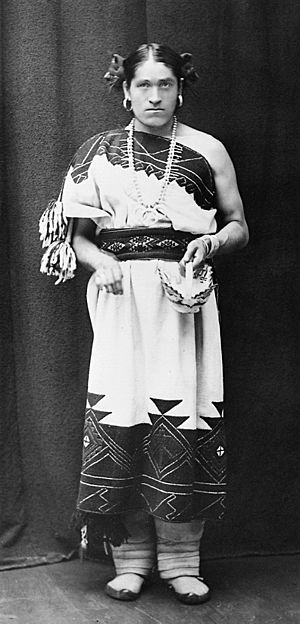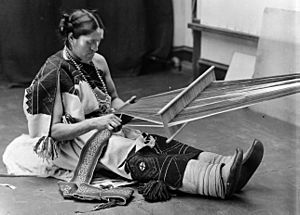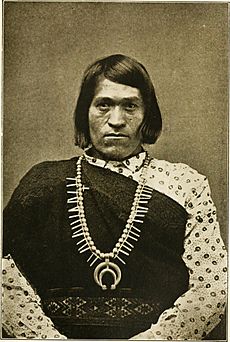We'wha facts for kids
Quick facts for kids
We'wha
|
|
|---|---|

We'wha, a Zuni lhamana, circa 1886
|
|
| Born | 1849 |
| Died | 1896 (aged 46–47) |
We'wha (born 1849, died 1896) was a famous Zuni Native American from New Mexico. We'wha was a talented artist, known for weaving and making pottery.
We'wha was a well-known lhamana. In traditional Zuni culture, lhamana are people born male who take on social and religious roles usually done by women. They often wear a mix of men's and women's clothes. They are also known for helping solve problems between people.
We'wha was like a special ambassador for Native Americans, especially the Zuni people. We'wha taught many European-American settlers, teachers, and scientists about Zuni culture. In 1886, We'wha visited Washington, D.C. and even met President Grover Cleveland.
We'wha became good friends with a scientist named Matilda Coxe Stevenson. Because of their friendship, many important facts about the Zuni people were written down and shared. Stevenson wrote that We'wha was very smart and kind to children. We'wha was respected by everyone in the Zuni village.
Contents
We'wha's Early Life
We'wha was born in 1849 in New Mexico. At this time, the Zuni tribe could still freely practice their religious customs. The year We'wha was born was also when the Zuni first met Americans.
In 1853, a disease called smallpox came to the village. Both of We'wha's parents died from this illness. We'wha and their brother were then adopted by their father's sister.
We'wha was part of the donashi:kwe (Badger People) clan from their mother's side. We'wha also kept ties to their father's clan, the bichi:kwe (Dogwood People). We'wha's new family included two foster sisters and a brother.
Zuni children could be recognized as lhamana from a young age. We'wha first took part in religious ceremonies for Zuni boys at age twelve. A few years later, the tribe saw We'wha's lhamana qualities. We'wha's religious training then moved to female relatives.
We'wha learned skills usually done by Zuni women. These included grinding corn, making special pottery, and cooking. In 1864, the Zuni and American soldiers won a battle against the Navajo. Some Zuni people, including We'wha and their family, moved to new farming lands. Here, We'wha worked as a farmer, which was a job usually done by men in Zuni culture.
We'wha's Adult Life
In the 1870s, We'wha continued to live and work on the farm. As We'wha's adoptive mother got older, We'wha took on more household duties. We'wha's older adopted sister also helped with these tasks.
In 1877, Protestant missionaries came to the Zuni tribe. These missionaries wanted Native Americans to become part of American society. They hoped to do this by teaching them Christianity. These were likely the first white people We'wha had met. At this time, We'wha was in their thirties.
A Presbyterian minister and doctor named Taylor F. Ealy came to the village in 1878. He came with his wife, two daughters, and a teacher. They were assigned to a school built the year before. We'wha helped Mrs. Ealy care for her young daughters. We'wha also helped with teaching and housework.
Mrs. Ealy wrote about We'wha in her diary. She mentioned making clothes with We'wha. We'wha likely received goods, like clothes, for their work with the Ealys. In 1881, the Protestant missionaries, including the Ealy family, left the village. The school stayed but did not have much impact until 1888.
Friendship with Matilda Coxe Stevenson
Matilda Coxe Stevenson and We'wha first met in 1879. They were both working with Mrs. Ealy. Stevenson wrote that We'wha was very friendly to visitors and wanted to learn English. We'wha's strong character made their words important among both men and women.
By learning English, We'wha could talk well with white visitors. This helped build a strong friendship with Mrs. Stevenson. Stevenson visited We'wha many times between 1881 and 1896. These visits helped their friendship grow.
In 1879, Stevenson brought laundry soap to We'wha's village. She taught them how to use this stronger soap to wash clothes. Soon, We'wha began washing many clothes for the Protestant mission members. We'wha earned silver dollars for this work.
We'wha then moved to Fort Wingate to wash clothes for soldiers and the captain's family. We'wha even expanded the business to wash for other white settlers. Few Zuni people worked for white people for money. If they did, "the men wearing female attire being preferred to the women on account of their strength and endurance."
We'wha was hired by Stevenson to make Zuni religious pottery. This pottery was later shown in the National Museum in Washington, D.C.. We'wha was a very skilled potter. We'wha also followed the strict religious rules for making Zuni pottery.
As a talented weaver, We'wha also made baskets, dresses, blankets, and sashes. People said We'wha had a great eye for pleasing patterns and colors. George Wharton James, an expert on Native American weaving, praised We'wha's skill. He said We'wha's blankets and dresses were "exquisitely woven."
We'wha's Later Life
After returning to the Zuni community, We'wha faced some challenges. We'wha was arrested with five other Zuni leaders. They were accused of witchcraft and spent a month in prison.
In 1896, We'wha passed away from heart failure. This happened shortly after taking part in the yearly Sha'lako festival.
We'wha's Legacy
We'wha was featured in a Google Doodle on November 1, 2021. This doodle shared details about We'wha's life and importance. It also included a weaving game to help people learn about Zuni weaving.
See also
 In Spanish: We'wha para niños
In Spanish: We'wha para niños
- List of people with non-binary gender identities
 | Madam C. J. Walker |
 | Janet Emerson Bashen |
 | Annie Turnbo Malone |
 | Maggie L. Walker |




